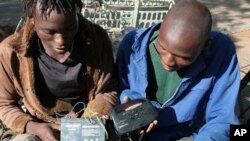Zimbabwe is restricting independent media and free expression by issuing licenses only to commercial radio stations with ties to the ruling party, according to a new report by Amnesty International.
Since 2001, only two radio stations — one owned by a government minister and another belonging to a state-owned media company — have been licensed, the London-based group is reporting.
Detailing what it calls a crackdown on those who have been campaigning for the licensing of "community radio stations," Amnesty International also says relays specific recommendations for Harare officials to ease restrictions.
"We are saying the issuing of licenses must not be done in secrecy," says Deprose Muchena, the non-profit's director for southern Africa. Other recommendations include removing financial impediments to commercial broadcast, such as "punitive fees structures for those who wish to establish community radio stations."
"Finally we are looking at parliament carrying out its constitutional mandate in the community radio sector," Muchena added. "There should be revision of any obstacle that still lie in the statute books so that Zimbabweans can enjoy their freedom of expression.”
The organization is also calling on Harare to "allow sufficient access for broadcasting licenses, particularly at community level," and "fully respect editorial and programming independence of community radio stations."
The term "community radio" has become a flashpoint between Zimbabwean officials and free speech advocates since the 2001 Broadcasting Services Act legalized independent commercial radio stations. While the act technically ended airwave monopolization by the state broadcaster, Zimbabwe Broadcasting Holdings, only two stations — again, both linked to the ruling party — have since been allowed to operate.
Zimbabwean Minister of Information Jonathan Moyo on Tuesday told parliament that more radio licenses would be issued this year, but expressed concern that many applicants are posturing as "community radio" outfits that are merely attempting to broadcast dissenting political views.
"This question has been with us for some time," said Moyo. "Individuals have set themselves up as 'communities' and they are calling themselves community radio this, community radio that — there are all sorts of associations that are claiming to be community radios."
The issue has been marginalized on the national agenda, "as a result of some activism out there," he added, referring to the Zimbabwe Association of Community Radio Stations (ZACRAS), which has been mobilizing communities to apply community radio stations.
Until Zimbabweans settle a legal definition of "community radio," no community radio station licenses would be issued.
Harare-based ZACRAS representative Kudzai Kwangwari does not expect any community radio licenses to be issued in the near future. The reason, he says, is because government officials fear dissenting views.
"[This] is ignorance from the government," he said. Without platforms to share information that enriches a listener's understanding issues, citizens can be "cheated and bullied by politicians."
"They are afraid of informed citizenry, so for that they are trying to buffer the free flow of information," he said.
According to Amnesty International, at least 28 independent community radio initiatives in Zimbabwe are waiting to be licensed. Some of the people involved in the initiatives claim to have been attacked by the authorities for trying to promote imperialists’ agenda.
Zimbabwe is ranked 162 out of 197 countries listed on the Freedom House Press Freedom Rankings.




